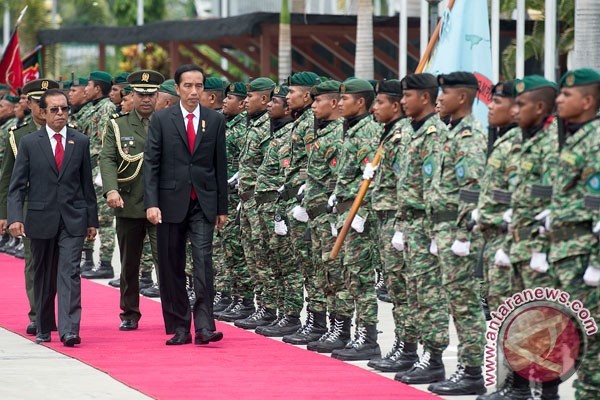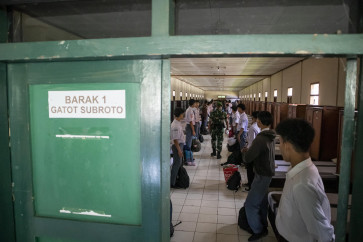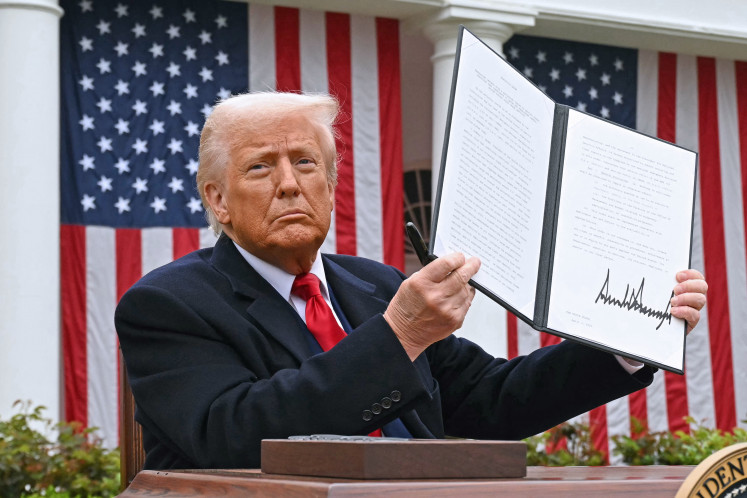International judicial bodies a viable alternative to border disputes
Change text size
Gift Premium Articles
to Anyone
 President Joko Widodo (second left) and Timor Leste President Taur Matan Ruak (left) inspect a guard of honor at the Palacio Presenditial in Dilli on January 26. (ANTARA/Widodo S Jusuf)
President Joko Widodo (second left) and Timor Leste President Taur Matan Ruak (left) inspect a guard of honor at the Palacio Presenditial in Dilli on January 26. (ANTARA/Widodo S Jusuf)
T
here is merit in exploring alternative ways to solve long-standing maritime delimitation disputes, such as through international judicial bodies to achieve stable maritime boundaries, amid maritime conflicts among ASEAN members.
Such an arrangement would allow countries to profit from accessing rich resources located in areas in which they exercised sovereign rights, a senior official from the International Tribunal for The Law of the Sea (ITLOS) said.
ITLOS president and judge Vladimir Golitsyn said Thursday that the 1982 UN Convention on the Law of the Sea (UNCLOS) represented a major step forward in settling disputes through the international adjudication system.
“[The convention] echoes the duty imposed on states by the UN Charter to settle disputes by peaceful means,” Golitsyn said during his keynote speech at an international maritime conference in Dili.
The convention obliged conflicting parties to submit disputes to the ITLOS panel if a binding settlement could not be reached, perhaps due to differences in interpretation of international laws and treaties, he said.
Timor Leste is one case study in which the international judicial system offers an alternative way out in settling disputes that involve parties unwilling to negotiate.
On April 11, Timor Leste initiated compulsory conciliation under UNCLOS, a method to compel unwilling countries into settling disputes, against Australia.
Australia has, in the words of Timor Leste Prime Minister Rui Maria de Araújo, shown its “unwillingness” to settle its maritime borders with his country, standing “behind provisional arrangements that do not conform to international law.”
“This procedure can be used when no agreement has been reached between neighboring states and one state has made a declaration excluding the jurisdiction of a dispute settlement body on maritime boundaries,” Araújo told the event.
If internationally led adjudication works for Timor Leste, the argument does not necessarily hold water if seen from an Indonesian and ASEAN perspective.
International judicial bodies did not have a role in the settlement of disputes in ASEAN or involving ASEAN member states, Indonesia’s presidential special envoy for Indonesian-Malaysian maritime delimitation Eddy Pratomo said.
“ASEAN does not have a mechanism in its framework that [could resolve] maritime boundaries, they only have a high council — it all depends on [bilateral negotiation and] the national interests of those involved,” Eddy told The Jakarta Post.
In order for arbitration to occur, both disputing sides had to issue a joint declaration to bow down to the rules of engagement set out by the international judicial body, he said, citing the Timor Leste-Australia case.
“The issue of maritime boundaries is really complicated. We have to proceed with caution and work toward a mutual agreement,” he said.
As opposed to Australia, Eddy asserted Indonesia was “very much willing ” to negotiate its borders with Timor Leste, saying that negotiations on maritime boundaries were expected to start this year.
Indonesia is in the latter stages of concluding unresolved land boundaries with Timor Leste, which will be followed by negotiations on maritime borders with its neighbor.
Indonesia and Timor Leste have been negotiating their border since 2002, soon after the latter formalized its independence from Indonesia following a UN-supervised referendum held in 1999.
Both countries have agreed on more than 900 coordinates as border points save for two areas, the Noel Besi-Citrana and Bijael SunanOben segments.









